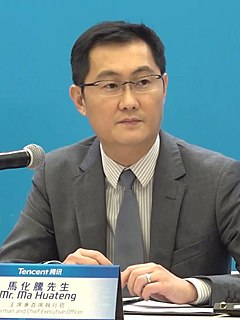A Quote by Ma Huateng
I think every Internet user likes personalization.
Related Quotes
I don't actually think of the internet as the bad guy. I think of the internet as doing a hell of a lot of wonderful, fascinating, interesting things. A lot of information that's exchanged on the internet is extremely useful, and every once in a while it percolates up to knowledge. Wisdom is far harder to come by.
The principles of good human-to-computer interface design are simplicity, support, clarity, encouragement, satisfaction, accessibility, versatility, and personalization. While it’s essential to heed these, it’s also important to empathize with and inspire your audience so they feel you’re treating them less like a faceless user and more like a human being.
Every dollar spent to punish a drug user or seller is a dollar that cannot be spent collecting restitution from a robber. Every hour spent investigating a drug user or seller is an hour that could have been used to find a missing child. Every trial held to prosecute a drug user or seller is court time that could be used to prosecute a rapist in a case that might otherwise have been plea bargained.



































